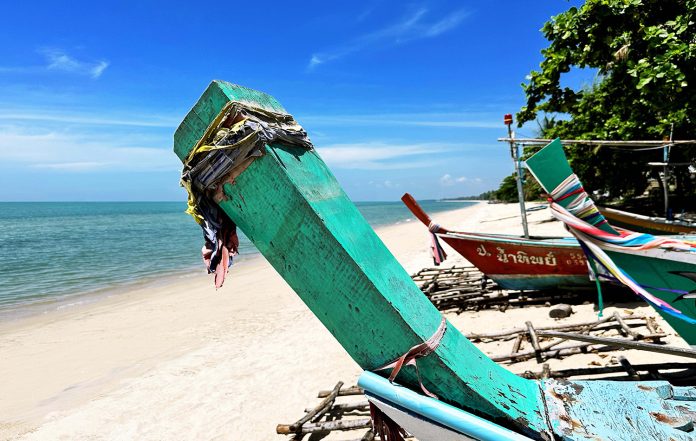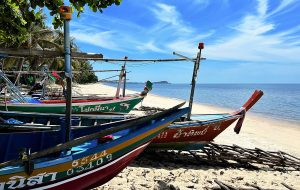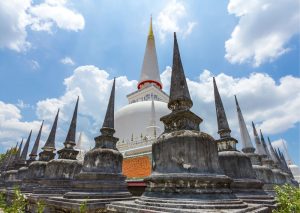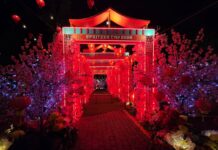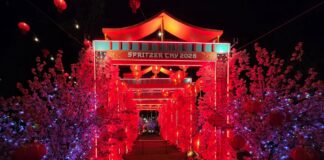Seafront enclave in Nakhon Si Thammarat to start welcoming international flights
Travellers able to explore the authentic cultural and natural heritage of the region
Former Laguna Phuket CEO, Ravi Chandran, heralds huge potential of the destination
4 JULY 2023 – SICHON, THAILAND: Southern Thailand never fails to wow the world’s travelers with its sandy beaches, spectacular scenery, and rich cultural heritage. Now, a new destination is about to emerge onto the world stage as a haven of “tranquil tourism.” With the brand-new international terminal at Nakhon Si Thammarat Airport set to open by Q4 2023, the coastal enclave of Sichon is poised to become a new jewel in Thailand’s tourism crown.
Sichon is a serene and peaceful destination where travelers can embrace Thailand as it has existed for centuries. Buddhists pay their respects in ancient temples, fishermen pull their catches up onto the beach from emerald green waters, farmers wrestle coconuts down from soaring palms and artisans patiently work looms to weave materials dyed by natural colours derived from local fruits. There is a community life that hums along at its own pace and to the beat of its own drum.
All is framed at the front by the translucent waters of the Gulf of Thailand, and Sichon beach in particular, recognized by world-renowned travel guide Lonely Planet as one of the best 10 beaches in Thailand, while behind is the imposing Khao Luang mountain range, a terrain intersected by waterfalls traversing its sides and up which travelers can hike to discover awe-inspiring views from its summit. And while it is blissfully off the beaten track, it is all 40 minutes from the new international airport.
One man struck by the potential of the destination is Mr. Ravi Chandran, the former CEO of Laguna Phuket (part of Banyan Tree Holdings) who was part of the leadership team that played a role in the transformation of Phuket’s former tin mining district into Southeast Asia’s leading integrated resort destination.
Now, as Senior Advisor to Urasaya, a residential and hospitality development concept that will be unveiled on Sichon Beach in the coming months, he is charting a course for the destination as a beacon of carefully-managed, eco-conscious, locally-inspired tourism.
“Sichon is quite something. Far from the tourist crowds, this is life in southern Thailand as it was 30 years ago – naturally beautiful, culturally authentic and perfectly peaceful. This is the Thailand visitors want to see and it is somewhere people will want to live,” said Mr. Ravi Chandran. “I really think that this is a new beginning for the south of Thailand and it is a chance to get it right first go – by embracing a future defined by heritage, nature and sustainability.”
Sichon is not a new mass tourism hub now, or in the making. High-rise hotels are not expected to rise along the coast and the buzz of banana boats and jet skis will not be heard offshore. Instead, the ambience will remain highly in tune with life as it is now. And in that lies its greatest attraction.
Visitors are able to explore the local beachfront market, stroll through coconut groves, and swim in the cool waters of the Gulf of Thailand with the island of Koh Samui in full view and the pods of pink dolphins on the horizon.
Travellers can uncover the rich heritage for which the province of Nakhon Si Thammarat is well known within Thailand. The provincial capital, also called Nakhon Si Thammarat, is one of Thailand’s oldest cities with a history that dates back over 1,200 years, with its focal point Wat Phra Mahathat, the Kingdom’s oldest temple and an annual destination for Buddhist pilgrims.
Active adventurers and wildlife lovers can discover the lush landscapes of Khao Luang National Park, home to the 1,780-metre Khao Luang mountain, Thailand’s second highest peak, and a wide variety of flora and fauna including 300 types of orchid, 340 species of bird and even mammals such as tapirs, leopards and porcupines.
“Naturally, sustainability will underpin every aspect of Sichon’s future development,” adds Mr. Chandran. “The concept is already ingrained in the area’s heritage, as local people have been practicing responsible, eco-sensitive crafts for centuries. Take Kiriwong Village where materials are hand-woven and organically dyed using the local fruit from indigenous trees, including mangosteens.
Or head to Pak Phanang river and watch fishermen cast their nets. This is the most authentic and natural destination I have seen in Asia.”



